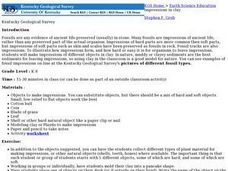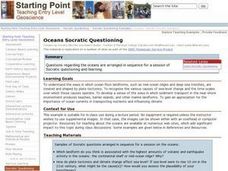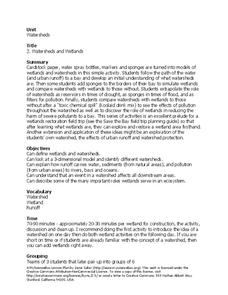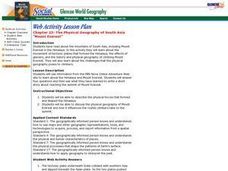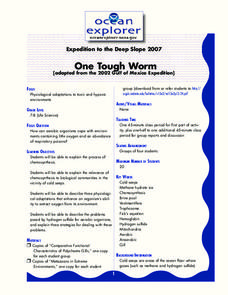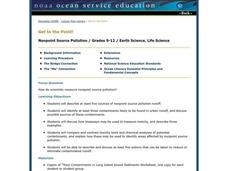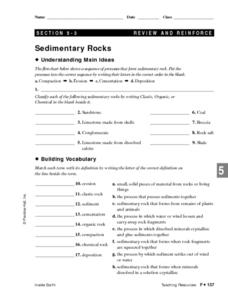Curated OER
Impressions in Clay
Students examine how fossils are created. They make impressions of different objects in clay and compare them to examples of fossils.
Curated OER
Stream Watch
Students discuss why it is important to take care of streams, what is non-point source and point source pollution, what are some causes of pollution in streams, and what can we do to prevent some of these causes of pollution? They steam...
Curated OER
Water Purification
Students develop an understanding and appreciation of water purification techniques and their implications for health maintenance.
Curated OER
How Our Water Becomes Polluted
Students list causes of water pollution, discuss how people contribute to water pollution, and explain concept of watershed.
Curated OER
A Bight is Born
Students sequence and model the events leading to the formation of the southeastern coast of the United States, including the formation of the South Atlantic Bight.
Curated OER
Oceans Socratic Questioning
Students participate in a whole class discussion of ocean-floor structures and plate tectonics. They respond to prompts in a structured sequence that lead them to conclusions about the role of plate tectonics in the creation of sea-floor...
Curated OER
Watersheds and Wetlands
Learners simulate a chemical spill. In this watersheds and wetlands lesson, students build a watershed and observe what happens when it rains. Learners add wetlands to their watershed models and examine the effects of water pollution.
Curated OER
A Limnology Study of Drainage Ditches
Students chemically test water, observe microscopic organisms in the classroom, and screen the sample for macroinvertebrates. They design a reporting sheet that list all the items to be tested and a space to record the results.
Curated OER
Relative Dating - Telling Time Using Fossils
Students use fossil range charts to explain relative dating. They graph for ammonites, marine organisms that went extinct at the same time as dinosaurs.
Curated OER
The Physical Geography of South Asia
Students describe the physical forces that formed and shaped the Himalaya, then discuss the physical geography of Mount Everest and how it influences the routes climbers take to the summit.
Curated OER
Gravity and Erosion
Young scholars examine how gravity affects erosion and deposition through teacher demonstation, and discuss its impact on their communities.
Curated OER
Exploring Hawaii's Beaches
Fourth graders search the shore and find objects on the beaches of Hawaii. In this exploring Hawaii's beaches lesson, 4th graders play "I Spy" with objected collected at the beach. Students compare biotic and abiotic materials and...
Curated OER
Inferring Ancient Environments From Fossil Foraminifera
Students use a reference diagram of fossil foraminifera with their paleo-water-depth assignments to interpret the water-depth of a particular area of California during the geologic past.
Curated OER
Non-Point Source Pollution
Learners study non-point source pollution. They research the concept of bio-degradation and/or Nutrients/Fertilizers and discuss how non-point source pollution impacts the environment. Afterwards, they participate in an interactive...
Curated OER
Are You Thirsty? The Effects of Pollution on Drinking Water
Discuss the availability of clean, plentiful water and the causes of water pollution. In groups, sixth graders discuss problem-solving methods for keeping water clean. They explore the function of water treatment plants and perform...
Curated OER
One Tough Worm
Young scholars explain the process of chemosynthesis and its relevance to biological communities. In this investigative lesson students discuss chemosynthetic communities, then in groups they are assigned a species and are to calculate...
Curated OER
Water Quality Assessment
Students evaluate water quality of different sources. In this water assessment lesson students chemical testing, identify biological factors in the stream, and write a paper on their position of the stream's quality.
Curated OER
Let's Take a Rock Apart
Students take a crushed rock and sort the remains of the rock minerals into different categories based on the different properties. In this sorting lesson plan, students learn what makes up a rock and how to sort something into categories.
Curated OER
Get to the Point!
Students write out sources of pollution and identify contaminants are most likely found in urban runoff. In this pollution lesson students compare toxicity tests and chemical analysis of potential contaminants.
Curated OER
Deep Freeze
Students practice various sampling methods for retrieving data under water, ice, and soil. They use the sample material to make temperature measurements, chart contents, and draw their own conclusions as to what is happening in the...
Curated OER
Earth: The Water Planet
Students elicit data on the water cycle, ocean topography, and island formation in this six lesson unit. The ocean floor and the properties of water are examined through a variety of discussions and hands-on experiments.
Curated OER
Sedimentary Rocks
Second graders receive an introduction to the rock cycle. They dicuss the geologic rock cycle. They create a simulation of a sedementary rock.
Curated OER
Pollution Solutions
Students visit a local park to test the quality of the aquatic environments. They search for sources of pollution and examples of pollution control. Based on their obeservations and experiments, they rate their local environment.
Curated OER
The Big Burp:A Bad Day in the Paleocene
Students describe the overall events that occurred during the Paleocene extinction event as well as the processes that are believed to result in global warming after group research. They infer how a global warming event could have...


